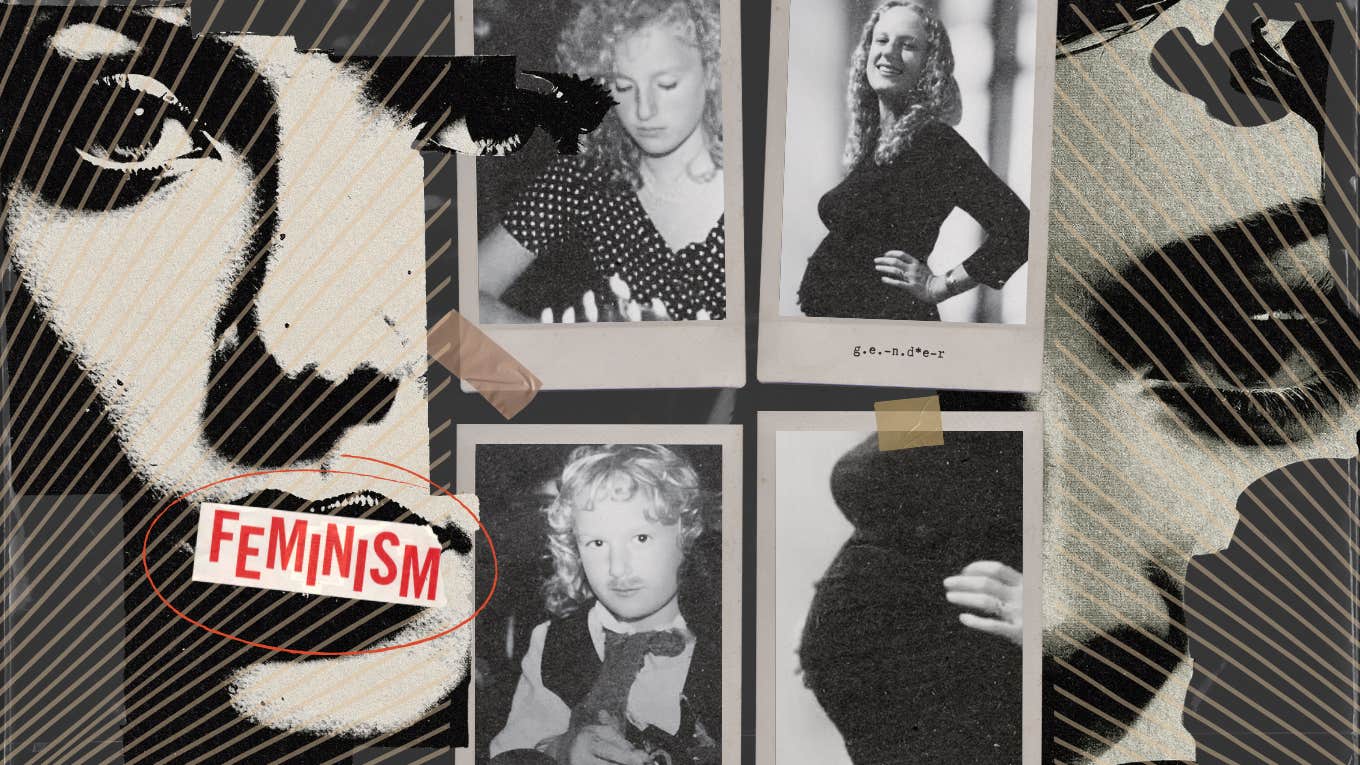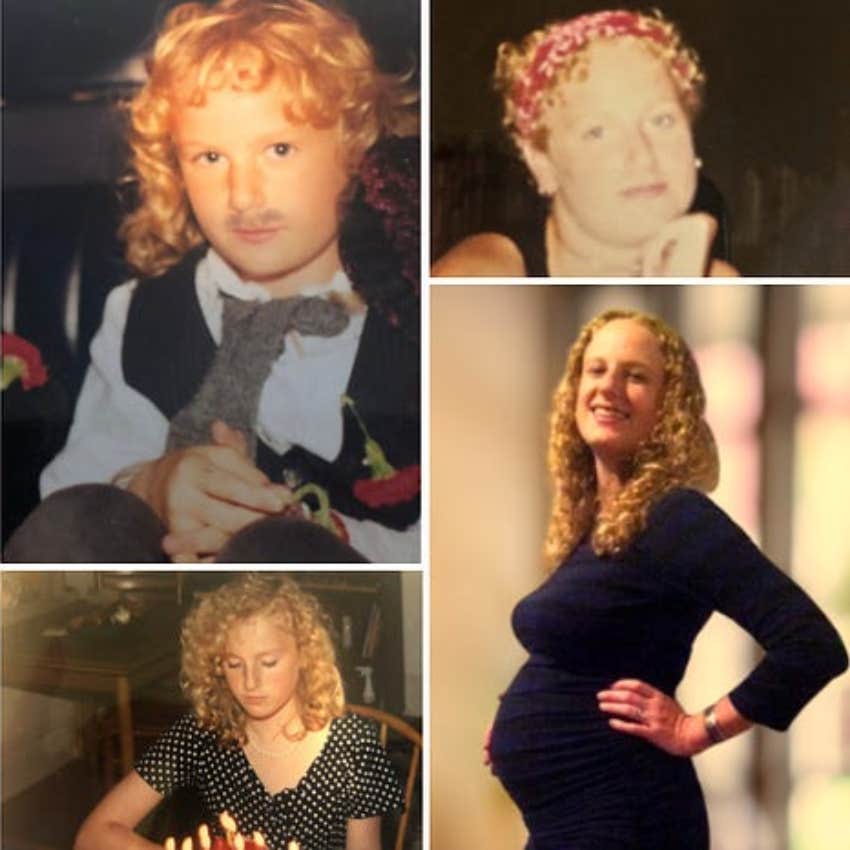I Identify As A Woman Because I’ve Been Marginalized As A Woman
Gender fluidity is the future of feminism.
 Personal Photos | Courtesy of Author
Personal Photos | Courtesy of Author “You’re a nice big brother,” the child at the playground said. I was pushing my younger sister on a swing, doing the “underdog,” while she repeatedly squealed, “Again! Again!”
“I’m a big sister,” I clarified. In my head, I added, And I’m not usually all that nice. I had been caught in a rare moment of generosity — or, more accurately, desperation. My mother was sitting on a bench on the sidelines and I hadn’t yet made any playground friends.
This child looked older than me, perhaps eight years to my six, but still seemed to be promising playmate material — certainly more promising than the tiresome two-year-old on the swing. Yet when I clarified that I was a big sister, not a big brother, she proceeded to flush a deep shade of red. “Oh,” she said and scurried away.
It wasn’t the first time someone had mistaken me for a boy, and it wouldn’t be the last. My mother kept my mop of curls closely cropped because they were easier to comb through, and though she occasionally stuffed me in frilly frocks on holidays or other special occasions, I was most comfortable in pants and oversized sweatshirts. In fact, before I could walk or even crawl, my parents jokingly christened me “Little Ricky” because strangers on the street so often stopped to ooh and aah at their adorable baby boy. “That’s our Little Ricky,” they said.
The nickname didn’t stick, but years later, I would be christened with a new one: “Boy with a Vagina.” In college, I liked hanging out with “the guys.” According to them, I was the most “down-to-earth chick” they’d ever met. I preferred beer to sweet girly drinks, and I had a dry sense of humor that was apparently unfeminine.
But growing up, I wasn’t an unabashed “tomboy,” either. Yes, I played handball with the boys during recess. Yes, I was fierce on the basketball court. Yes, I preferred pants, got easily annoyed with “girl drama” and never successfully mastered a cartwheel or a French braid.
I also had tea parties with my dolls. I played “house.” I crushed after boys, filling multiple diaries with fervent ruminations on my unrequited love. I enjoyed baking cookies and serving people food. In my early 20s, I “got wicked hot” — as a Rhode Islander who would become my boyfriend so artfully put it. After I grew out my hair (for the second time) and retired from my baggy raver pants, I enjoyed selecting form-fitting skirts and shirts with plunging necklines that would make heads turn.
In short, like so many of us, I never solely identified with either extreme of the gender spectrum. I lingered somewhere in the middle of what society has labeled “masculine” and “feminine,” sometimes drifting a little further toward one end or another depending on the friends and social pressures I was experiencing at the time.
 Me, throughout the years, exploring various forms of gender expression.
Me, throughout the years, exploring various forms of gender expression.
It wasn’t until I had my first child that I fully leaned into my identity as a woman. Childbirth and childrearing have long been viewed as quintessentially “female” experiences, fulfilling our feminine desires to be nurturing and all-giving.
And yes, there were many tender moments. Benevolent hugs and warm cuddles and forehead kisses. But I didn’t feel like a woman because I was reveling in my newfound maternal instincts. In fact, nurturing had never come naturally to me, and for years, I had selfishly operated under the premise that my own needs, ambitions, and goals should matter.
My evolving experience of womanhood wasn’t so much wrapped up in my new identity as a “nurturer,” but rather my new identity as someone consistently relegated to the sidelines. Someone toiling in the background, suddenly overlooked at work, no longer operating in the public sphere.
I became a feminist somewhere around 3 a.m. It was at 3 a.m. that the streets were at their loneliest, the sky at its blackest, the air at its heaviest. My partner, by this point of the night, had usually been exiled to the living room couch, his snores uninterrupted by our baby’s cries. Our baby was either having herself a nighttime snack, wriggling in my arms as I paced the hallway, or wriggling in my bed as I gave up, yet again, on putting her back in her crib.
I grew to hate my breasts for tethering me to my baby so ruthlessly, for requiring untold amounts of planning and preparation to separate myself for more than two hours at a time. And nearly all these hours, of course, were spent at a job to which I’d been pressured to return after 10 scant weeks, a job at which I had to scurry to a back room at least twice a day to hook my breasts to a machine like a milk cow. I was tethered in ways that my partner was not, all while trying to navigate an unforgiving working world designed and largely controlled by men.
I’d had female friends before, but it wasn’t until I became a mother that I actively began to seek out the company of other women. In the early years, it was mostly mothers with babies of their own, and in the course of our frequently interrupted conversations, I learned we were all living a similar version of the same story.
The planning and preparation we’d poured into pumping and feeding had started to bleed over into most other family chores and activities. We were coming to resent our breastless partners, who were still helpful around the house but seemed less burdened by parenthood, less changed by it, less cognizant of its ceaseless demands. Returning to work had been universally awful and being at work was not much better.
We all had the same stories. But according to The Internet, we were supposed to be talking about mommy hacks and freezer meals. We were allowed the practical challenges of motherhood, but not the cosmic ones. And so, just as women have for centuries when it comes to other “female experiences” we’re not supposed to talk about — like sexual violence, miscarriage, and abortion — we spoke only in whispers and innuendos.
Everyone assumes that motherhood gains you automatic admission to the “mom friend club,” but no one talks about the loneliness, the isolation. No one talks about shouting across chasms, fighting to be heard. No one talks about losing your sense of self.
I know I’m not the only feminist who identifies as a woman primarily through my experience of marginalization, not because I’m naturally drawn to the “female” end of the gender spectrum. While I love the idea of owning my own gender identity, this can feel confusing in the context of a society that tries its hardest to push me toward female and in so doing, to relegate me to the sidelines.
After all, the binary is not merely a matter of “man/woman” or “boy/girl.” It’s wrapped up in a system that grants a disproportionate amount of power to one-half.
In the long term, I’ve come to realize that challenging the gender binary is our best shot at achieving gender equality, and gender fluidity is one of our most powerful weapons when it comes to smashing the patriarchy. But if I’m being honest, it took me a long time to understand this. It’s not that I held any hate in my heart for members of the trans community, but I found the entire concept of gender fluidity to be confusing, at best.
How, I’ve wondered, can we simultaneously challenge the gender binary and acknowledge the very real ways that women continue to be marginalized by it? How can we work to eradicate gender inequalities without perpetuating gender divides?
These are questions I think we’re still working out. I believe we can hold space for the ambiguity, the tension, and the confusion without spiraling into resentment, division, and prejudice.
The child at the playground thought she had insulted me by referring to me as a “big brother,” but I don’t remember minding all that much. I found it somewhat thrilling, like being undercover. I only corrected her because I didn’t want to get caught in a lie. After all, I had a vagina, which meant there was no way I could be a boy.
Growing up, I remember scrawled comments from teachers in the margins of my essays. Singular pronoun! Pick “he” or “she.” I always thought this was a stupid rule. Why did we have to assign a hypothetical person a gender when it wasn’t at all relevant to the point we were trying to make? Why didn’t English have a gender-neutral singular pronoun?
If I’d had the language, encouragement, and permission to refer to myself as “they/them,” I see no reason why I wouldn’t have. Between birth and somewhere around the second grade, society wasn’t sure what to label me, and in hindsight, it was liberating.
Now, after four decades of socialization, it’s hard to say what I “truly am” and it’s hard for me to challenge my own identity as a woman when it has defined so many aspects of my life.
I often imagine a future, perhaps for my great-grandchildren, in which pink and blue are merely colors of the rainbow that anyone can like, in which there are no boy’s toys and girl’s toys, in which kids can don skirts or pants or headbands or baseball caps based simply on what they feel like wearing that day. I imagine a future in which our so-called “feminine” and “masculine” qualities are equally celebrated, in which we have permission to lean into each.
The present can be murky and confusing, and that’s OK. Let’s muddle our way to a future in which the genitals we were born with have no bearing on the work we do or the amount of money we make, on who we love, or who gets up to feed the baby at 3 a.m.
Kerala Taylor is an award-winning writer and co-owner of a worker-owned marketing agency. Her weekly stories are dedicated to interrupting notions of what it means to be a mother, woman, worker, and wife. She writes on Medium and has recently launched a Substack publication Mom, Interrupted.

